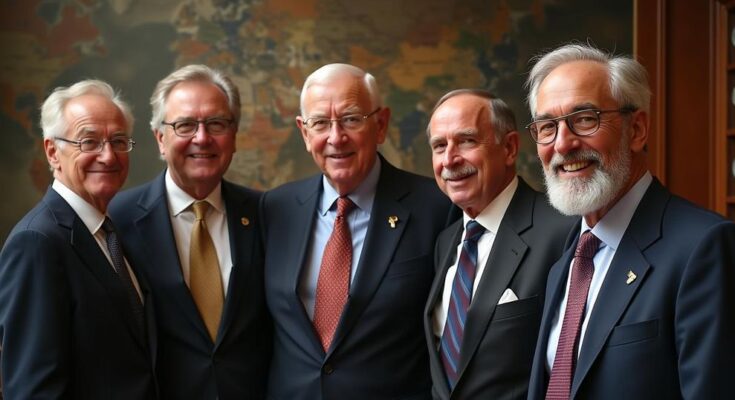The 2024 Nobel Prize in Economics was awarded to Daron Acemoglu, Simon Johnson, and James A. Robinson for their research on the formation and effects of institutions on prosperity. The awards celebrated notable contributions across various fields while highlighting issues of gender representation and the prize’s controversial origins. This year’s Nobel festivities wrap up with a focus on the intersection of innovative achievement and societal impact.
In an exhilarating declaration, the 2024 Nobel Prize in Economics unfurled its honors upon the trio of brilliant minds: Daron Acemoglu, Simon Johnson, and James A. Robinson. They were recognized for their enlightening contributions to understanding the intricate dance between institutions and prosperity. As the final accolade in a grand series of Nobel announcements, this recognition not only crowns their dedicated research but also emphasizes the pivotal role institutions play in shaping economic destinies. This year’s Nobel festivities, emblematic of human ingenuity and discovery, highlighted the interplay of innovation across various fields. Just a glimpse into the achievements reveals a rich tapestry of honors: the Peace Prize was awarded to the Japanese advocacy group Nihon Hidankyo for their resolute fight against nuclear arms. Meanwhile, the Physics Nobel recognized the groundbreaking work of John Hopfield and Geoffrey Hinton in machine learning, echoing the promise of technological advancement. Chemistry’s laureates, David Baker, Demis Hassabis, and John Jumper, were saluted for their strides in protein-related sciences that influence both health and environment. However, this year’s celebrations take on a particularly poignant tone when reflecting on gender representation within the Nobel ranks. Among the 93 laureates since the economics prize’s inception, Claudia Goldin made waves last year as one of the very few women to ever receive this honor. Critics, however, draw a shadow over the economics prize, labeling it the “false Nobel,” a moniker borne from its origins distinct from the original five prizes decreed by Alfred Nobel’s will in 1896. Established through a donation from Sweden’s central bank in 1968, the economics prize remains controversial yet maintains rigorous selection processes governed by the esteemed Royal Swedish Academy of Sciences. This dichotomy adds layers to the narrative of value and validation attributed to these awards. As we project into the future, the allure of the Nobel Prizes will endure, with the allure of new groundbreaking discoveries beckoning upon December 10th, the date etched in history as a tribute to Alfred Nobel’s legacy. This convergence of brilliant minds, diverse fields, and the quest for knowledge crafts a compelling story that continues to unfold, a testament to progress that inspires generations.
The Nobel Prize in Economics, although labeled as a latecomer to the Nobel family, holds a prestigious spot among the accolades awarded annually. Since its establishment in 1968, it has recognized transformative contributions to the understanding of economic phenomena and institutional impacts on societies. This backdrop provides a lens through which recent laureates can be appreciated not just for their individual brilliance, but also for their collective ability to shape how we construe the relationship between institutionality and prosperity, a reminder of the dynamic landscape of economics. Furthermore, the stark gender disparity in Nobel recognitions invites scrutiny as it reflects broader societal issues within academic and professional realms, beckoning a discussion on inclusivity and representation. The broader ceremony momentarily pays homage to outstanding achievements across various scientific disciplines, accentuating the interconnectedness of inquiry and striving for excellence that knows no gender boundaries.
The announcement of the 2024 Nobel Prize in Economics serves as a powerful reminder of the vital role of research in understanding societal structures. The recognition of Acemoglu, Johnson, and Robinson not only highlights their contributions but reignites conversations surrounding institutional efficacy and equity in economic prosperity. Coupled with the ongoing dialogue about representation in Nobel laureates, this year’s awards encapsulate a moment of reflection on both progress and the road ahead. As we celebrate these achievements, the challenge remains to foster an environment where diverse voices contribute to shaping our collective economic future.
Original Source: www.thehindu.com



